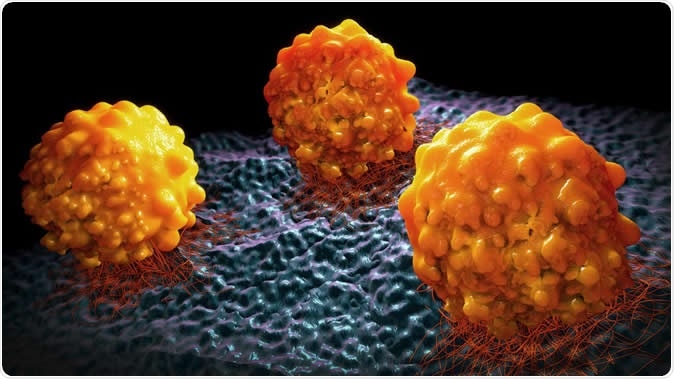Healthy cells normally undergo cell division, but when a genetic mutation causes uncontrolled cell growth, they form a tumor. Cancer is one of the leading causes of death worldwide, and most deaths happen when cancer cells start to metastasize or travel from the mother tumor to other parts of the body.
The new study, published in the journal Nature Communications, unveiled that cancer cells store fat or lipids in small intracellular vesicles called lipid droplets. These lipids serve as energy sources, enabling the tumor cells to become more invasive and have the power to metastasize.

Olivier Feron, a UCLouvain researcher, studies how cancer spreads through the body via metastasis. His major discovery was that cancer cells multiply by using lipids as food. His latest discovery, published in the scientific journal Nature Communications, is that lipid storage promotes cancer invasiveness. A new drug currently being tested to treat obesity may also help fight metastasis. Image Credit: University of Louvain
Aggressive nature of cancer cells
Cancer cells are known to be aggressive and can travel from the main tumor to other parts of the body. When they travel to nearby structures, they start to spread. As a result, cancer cells become harder to treat and target. The more severe the metastasis is, the poorer the prognosis or health outcome is.
In the study, the researchers identified a factor, dubbed as the TGF-beta2, which serves as the main switch responsible for both lipid storage and the aggressive nature of tumor cells. Further findings show that these two processes support and reinforce each other. It was found that by building up lipids, particularly fatty acids, cancer cells build up energy reserves, which are used during metastasis.
It was already known that the acidity of the tumor boosts the ability of cancer cells to invade surrounding healthy tissues. During the process, the cancer cells detach from their original anchor site and require them to survive under such conditions, which are considered harmful and fatal for healthy cells.
However, in the new study, the researchers showed that the acidity promotes the invasive power and formation of lipid droplets, through the same TGF-beta2 switch. These conditions help invasive cancer cells have the needed energy to move around, being able to tolerate the harsh conditions they face during metastasis.
The cancer cells are likened to a mountaineer, who comes prepared with food and equipment needed to survive the environment while traversing the path toward the summit.
With the discovery of the role of lipids or fatty acids in metastasis, the researchers believe that their findings could open the door for the formation of new therapies that can target aggressive cancer cells. Further, the researchers have shown the possibility to reduce tumor invasiveness and prevent metastasis using inhibitors of the TGF-beta2 expression. They also suggest that blocking the transport of fatty acids or triglyceride formation can help reduce the chances of metastasis.
For instance, the drugs that help combat obesity could be used to counter the development of metastasis, one of the major reasons why patients with cancer die or develop severe illness.
Cancer new data
The American Cancer Society has released the latest data on cancer statistics. The ACS estimates the number of new cancer cases and deaths in the United States. Based on the recent report, 1,806,590 new cancer cases and 606,520 cancer deaths are projected to occur in 2020.
There is an overall 29-percent decline in cancer death rates, translating into 2.9 million fewer cancer deaths. The number of deaths increases until 1991 but lowered continuously through 2017.
The decline in cancer deaths can be attributed to decreasing cases of the four leading cancers, including lung, colorectal, breast, and prostate cancer.
Though the cancer rates have declined, it’s important for researchers to evaluate current treatment options and find other means that can halt the spread of cancer cells, causing metastasis.
Journal reference:
Corbet, C., Bastien, E., Santiago de Jesus, J.P. et al. TGFβ2-induced formation of lipid droplets supports acidosis-driven EMT and the metastatic spreading of cancer cells. Nat Commun 11, 454 (2020). https://doi.org/10.1038/s41467-019-14262-3, https://www.nature.com/articles/s41467-019-14262-3